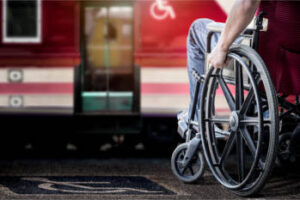Passengers with disabilities who travel by train in the UK could soon be entitled to financial compensation from train operators if they experience poor quality booked assistance.
The Office of Rail and Road (ORR), the rail industry regulator, recently completed a consultation on assisted travel improvements and this was one of the initiatives discussed to improve accessibility for disabled people who use trains. This would be similar to the compensation offered to passengers following service delays.
Another proposal discussed at the consultation included improved staff training. The ORR say the training should actively involve people with disabilities, with refresher courses held every two years (at least). There should also be standardised passenger handover routines at all mainline stops to ensure the continuity of support for disabled passengers. This would be backed up by improved inter-station communications more widely.

Recent research has found that alighting passengers currently receive poorer quality assistance than those who are boarding and this is something that needs to be addressed.
Another issue facing disabled passengers wishing to use trains is the availability and accessibility of ticket types. In April, Greater Anglia was forced to amend a campaign that proclaimed the end of paper tickets. There were numerous complaints including one from the Anglia Rail Users Group who, acting on behalf of a blind commuter travelling with a guide dog, claimed that digital faregates did not always recognise his disabled person’s smartcard so he does sometimes rely on paper tickets. Greater Anglia apologised and confirmed paper tickets will continue to be available for those who require them.
Accessibility for disabled people is vitally important to enable passengers to feel confident and comfortable when boarding and alighting trains, and making their way around train stations. Hopefully these proposed new penalties for rail operators and new staff training initiatives will help to improve the rail service for disabled people.